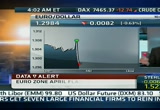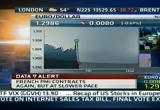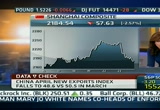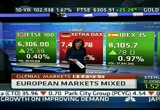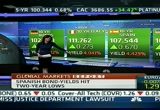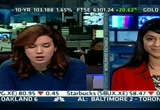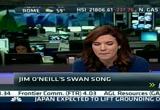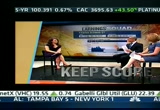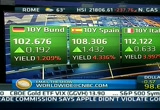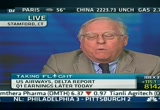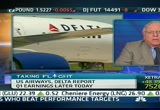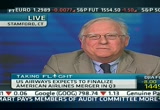tv Worldwide Exchange CNBC April 23, 2013 4:00am-6:00am EDT
4:00 am
hello and welcome to "worldwide exchange." i'm kelly evans and these are your headlines from around the world. disappointing pmi figures out of france and germany taking the edge off a positive start to trade in europe. investors contemplating weaker than expected manufacturing data out of china. earnings come in pretty mixed. michelin and kpm disappointing. and a bruised apple gets set to report much anticipated second quarter results later today. analysts are expecting profits to shrink for the first time in
4:01 am
a decade. plus, more details emerging about the suspect in the boston bombing as the u.s. charges him with federal crimes that could carry the death penalty. >> announcer: you're watching "worldwide exchange," bringing you business news from around the globe. >> welcome to "worldwide exchange." ross westgate will rejoin us in a couple of days' time. in the meantime, plenty to get through on the program today starting off with the flash pmi data for the eurozone. both the manufacturing and service sectors being closely watched for just how much momentum if any was carrying into the second quarter. you can see the euro/dollar down 0.6%. let's get more from chris williamson. chris, welcome. it looks as though the tone generally speaking here for april across manufacturing and services is pretty weak. >> yes. and one of the big worries is
4:02 am
that germany has been back into contraction. germany returned to expansion in the first quarter raising hope that the ecb was crawling out of its hole and is by mid year we would see some stabilization. with germany turning down, the rest of the region in collapse, it's not looking like an interesting picture. >> we're looking at the stoxx 600 up 0.4%. even though the euro is down significantly. this seems to imply the ecb may have to come in here. >> the ecb have said they're happy to -- to deteriorate. they may say, well, look, it's signs of stabilization there so let's wait and see. so it's an easy one to call. i suspect they might focus more on some of the other indicators, but in the pmi think that new orders growth which is deteriorating at a faster rate suggesting that momentum if anything is going in the wrong
4:03 am
direction, not improving. >> what about on a country by country level, besides germany been any others that are particularly notable? >> well, yes. france is interesting because the numbers rose. it's still in a steep rate of decline and it's in a much worse situation than the bank of france suggests the economy french economy is in. now, the german survey responses say the economies were worried about the impact prices. in france, they're much more domestically focused with some suggestions that things couldn't get any worse. >> well, the domestic situation is already a known negative. just to recap for viewers, as well, the composite, which includes both the services and is manufacturing, pmi came in at 46.5 in april for the eurozone. that was just ever so slightly above the 46.4 estimate and manufacturing came in 46.5. the services figure was 46.6. but, again, it's some of the
4:04 am
weakness in the core economy of germany that's catching the market's attention this morning. the euro weaker, the xetra dax off by about 0.2%. we're going to get some uk data out at 9:30. also coming up on the show, the how companies are battling to take a foothold in the alternative energy market in china. then at 11:10, we'll be joined by jim o'neill as he nears the end of his tenure at goldman sachs. we'll get his best and worst investment calls from his time in the city. we'll hear up for earnings from apple later in the day. and we'll cross live to boston for the latest on what has motivated marathon bomber
4:05 am
dzhokhar satisfy negative. china's industry minister says there are they're overcapacity problems, but accelerating activity is normal. since chris is here, let's ask you, as well, about some of the details. to just above contracts at 50.6. yeah. this is a big disappointment. we were hoping we would see some traction gain signs there with china that benefiting from that. the weakness came from the exports index. a turn around there which is a big disappointment, firms
4:06 am
addressing that buy by cutting back on their workforces. >> but the bulls will argue that rely more on domestic growth and less on economic consumption. is this not at least consistent with that shift? >> well, you could argue that and you could say this is going to promote the authorities to try to engender some more domestic growth, as well. in that sense, it can be quite a bullish signal. on the other hand, it's a negative signal for the global economy. it does raise worries that we are seeing some global slowdown again and we've got data out this afternoon for the u.s. it will be interesting to see there what's happened after some of the consumer sector data have shown renewed weakening in the u.s. >> exactly. now, i wonder, as well, when we talk about the chinese figures, if there's a sense just looking through the reports, you said the new export orders were a little weaker, but at the same time, there's this being world
4:07 am
to some extent the most important marginal economy coming in with that first quarter growth rate that really disappointed people. wa did the quarter indicate going into the second quarter? >> now we're suggesting that we could weaken further. perhaps 7.5% if we're starting the year that badly, it does raise the threat for the government's growth target. >> we'll leave it there for the time being. coming up, eunice yoon's report on the bird flu and growth in china if a. let's check on the market action on these figures at least across asia. li sixuan joins us now. >> thank you, kelly. concerns of growth in the world's second largest economy rose again today as china's pmi
4:08 am
figures dropped let than expected and shrinking export figures took effect. the shanghai xotit and the shenzhen bores tumbled by 2.6%. china business news reported that the country's total nonperforming loans rose from a year earlier. meanwhile, property plays tanked. a look at shares of vanke, it tanked 3.5%, despite 15% rise in q1 profit. and we're generally seeing a small first quarter for the country's real estate market. as home buyers rushed to complete transactions before the new curves take effect. but local media say deals have been slowing down in april. and that disappong f pmi number radicaled cyclicals and commodity in hong kong shedding 1% today. elsewhere, japan's nikkei 225 eased by about 0.3% as the yen regained some lost ground. in south korea, the recent fuel
4:09 am
and construction sector dragged the kospi lower by 0.4%. australia's asx 200 buffed the down trend ending higher by 1%. however, that down beat by china data weighed on all the miners is dumping almost a 10% today after announcing a special dividend plan. banks lent support on hopes of a potential rate cut. back to you. >> let's turn our attention now to the european session. here is what's happening as we are early into the trading session. the stoxx europe 600 is up about 0.5% today. let's zero in on some of the major bourses, as well. the ftse mib continues to rebound after a strong performance on the back of george napolitano's re-election. the ibex 35, up almost 1% even as we just learned from the bank of spain that first quarter gdp was down 2% year on year and
4:10 am
that the economy is expected to contract 1% for 2013. the ibex rallying 1%. the ftse 100 is up 0.4% and we'll look for public sector borrowing figures out at 9:30. here is the top stock gainers and losers, i should say, for the index today. over here, we have arm holdings out with earnings up about 7.5% as the chip builder continues to indicate the demand. we'll have a little bit more on that coming up later in the program. it's largely an earnings story, as well, for some of the other names here. it is some of the german names here that are weighing on the index, as well. in fact some of these levels continue to breach multi year lows. we're almost below 4% for the italian ten year. the spanish ten year, as well,
4:11 am
nosing down to 4.4%. with that yield falling below 11 is.7% to 1.67% as some of these global growth jitters resurface. now, in terms of earnings news last night out of the u.s., we heard from netflix 37 today, wall hear from apple amid the close. analysts expect the company to close its first year on year decline in a decade. revenue is expected to hit a record, but sales are only seen up 8el%. one of the weakest increases in several quarters. apple is being hurt by soft demand for the iphone and lower profit 345r7b8gins on the ipad. shares closed $398 or just about on monday. that's a 42% drop since hitting a record high over $700 back in september.
4:12 am
first quarter profits end up soaring on sold subscriber growth. netflix has benefited from new .original content. this includes the kevin spacey drama house of cards. it expects the diagram month to grow in the second quarter. they're among the best performers this year on the s&p. up 80%. sweden's investor ab has report a near 50% surge in profits. find out what's driving growth at the family controlled investment firm. don't go anywhere. ♪
4:13 am
[ agent smith ] i've found software that intrigues me. it appears it's an agent of good. ge has wired their medical hardware with innovative software to be in many places at the same time. using data to connect patients to software, to nurses to the right people and machines. ♪ helping hospitals treat people even better, while dramatically reducing waiting time. now a waiting room is just a room.
4:15 am
welcome back to the show. sweden's investor ab has reported a 48% jump in first quarter profit in the year. economic uncertainty remains in parts of asia and latin america but that the u.s. market seems to be recovering. let's get more from the senior investor for ab. look, you've talked about uncertainty in asia and latin. let's offer a little bit of opportunity here, as well. >> thank you for having me.
4:16 am
it's great to be with you. well, as i described, i think europe remains very soft and very -- in a way and very poor economic conditions. i think it's a little better in latin america, but the uncertainty in asia is clearly profound and i think you can see that in the numbers reported this morning, as well. >> experience in china is consistent with the weakening we're seeing in the manufacturing index there. >> yeah, definitely. on the other hand, you see pretty good development in the u.s. it's still not, i think, fully stable, but at least you are seeing a sustained recovery. >> look, most of your core holdings are still these major swedish companies. so will you begin to look at opportunities in the u.s. market, then? >> you know, we stay with our core investments. they are swedish based, but most of them have, you know, 90% plus of their say in south side of sweden or the nordics.
4:17 am
so in reality, they are very international and we look to grow those companies in north america and asia and latin america, as well. so for us, you know, we are going to continue to grow with them. >> is that part of the opportunity you see in mobile which is this leader in advanced power wheelchairs? i imagine that has to be potentially something that would be big for the u.s. market. >> yeah, it is their biggest market already. but it still has many growth opportunities in new countries as well as in north america. >> what about the impact of the u.s. health care overhaul? we've heard different reports from companies as we move through earnings season. some are talking about how it's boosting their opportunities, some are talking, though, about how it's a headwind in creating some uncertainty. tr your point of view, how does that legislation fit into the opportunity for this company? >> we actually see the legislation, you know, have very minor impact on this company. there are going to be some net positives, as you basically expand the coverage, but you can
4:18 am
say there are going to be some headwindes from other changes that results out of this legislation. so i think from our perspective, we view it as net-net, you know, unchanged in that sense. >> and what about the impact of currency, as well, on your quarter? because we've had such moves and i wonder how that's impacting your results now and is what impact that may continue to have as we move throughout the year. >> what we have seen is a strengthening of the swedish krona. but i would also like to say there that it's fair to remember that prethe financial crisis, the krona to the euro was about 850. and then during the height of the financial crisis, it went up to 11 to the euro. and now it's back to 850. so, of course, you know, the changes are tough to manage. but reality looking over a few years time, it's pretty much been stable. >> where is the wallenburg family generally speaking looking for growth at this
4:19 am
point? >> we look for -- we like to invest in companies that are, you know, of nordic base. last year, we added to the finish. maker of gas engines. and this year, we had that swedish base. and we will continue to invest in companies in our region and then help them grow outside of the nordics. >> and finally, a comment on banks in your home market. i know sbe is one of your core holdings. we'll be speaking with them later in the program. their shares are down after earnings today. what are some of the challenges? and do you remain committed to that investment? >> we are definitely very committed to scb as we are to all of our core investmentes and we hold them for the long run. what i think you see is a slower -- the result of a slower economic activity which results in slower loan growth and lower groegz in commission income. >> so at the same time, it's
4:20 am
rival banks doing better. this does seem to be a market where it's trading winners and is losers and i wonder again if you're concerned at all by the performance of seb here. >> no. we think actually the bank is doing all the right things and they are well positioned to capture growth in the future. >> we'll leave it there. borje ekholm, really appreciate your time, sir. we'll be talking to seb coming up. the cfo joins us. they just posted first quarter number peps citigroup has called a good kwaut beat. we'll have that interview at 11:05. shares are weaker this morning. news out of cyprus, as well, the new finance minister talking to reuters saying he's fully committed to the bailout. he believes parliament will approve it and that the gold sale they have discussed is not currently on the agenda. he said it's not something we're tackling right now. they may be waiting for a rebound in the gold price perhaps. capital controls, he's saying, hope to be lifted within days or
4:21 am
weeks. but we've heard that rhetoric before and not just in cyprus. dalian wand da group has transformed its do a multi functional conglomerate with interests in film, tv and amusement parks. its chairman is known as the country's second richest man. he only became a familiar face in the u.s. after his purchase of amc. ross talked to him in china. >> translator: we've been very clear that the cultural industry will be positioned as wanda group's most important sector. we have a clear target that by 2016 we will reach 40 billion yuan in revenue from the sector which is about $7 billion u.s. and to reach $80 billion yuan by 2020 making us about number seven or eight in the world. becoming top ten in the world is our goal. >> after spending that $276 become to buy amc, are you going
4:22 am
to add on to the group? are you going to buy in europe the likes of odian or cinemark? >> our next goal is to have a 20% share in the love very market by 2020. china alone won't be enough to help us achieve this goal as china could account for 2% in the best case. therefore, we have to conduct more m&a to achieve the target. recently, we are looking at cinema businesses not only in europe, but in australia and japan. >> your company is at the forefront of a number of chinese companies that are now expanding overseas. how easy is it to take chinese practices and transfer them or how do you merge the two different cultures? >>. >> translator: my philosophy is that their corporate cultures don't necessarily blend into our existing culture. they can keep their culture. for example, after the amc deal, we only sent one person from
4:23 am
wanda to amc as a liaison. we kept their core management team stable and gave them an incentive plan such as 10% of the net profit that could be paid out as a bonus. >> it's one thing to develop cememark business and surely the next stage is content. how do you get into that? what are you going to develop? >> translator: in a coastal city in china, the exact place will be announced in june and july. we will invest $5 billion u.s. to build the world's biggest film and tv complex. including film, production facilities, tourism. we've been planning this for about three years. we signed partner agreements with four of the world's top five movie companies. they partner with us and invest in china. in the next film, we will set up
4:24 am
joint ventures with the global movie giant. on top of that, we will soon acquire a leading film and tv industry in china. over the next few years, we'll have relatively big investments into the industry. >> fascinating stuff there. coming up tomorrow, ross catches up with the founder and chairman of one of china's real estate investment groups in another exclusive interview. tune in to find out what whong zhongkun thinks. the eu has decided to give spain two more years to cut its deficit. spain's gdp to debt ratio is now 10.6% of gdp. stephane pedrazzi is in madrid.
4:25 am
stephane, look, these numbers certainly raised some concern yesterday, but at the same time, we're looking at the ibex this morning. even after the ibex and bank of spain came out talking about a contraction in the first quarter rallying 1%. what's going on? >> it looks like the markets and the bond market on the market share changes. they think on a different budget policy. we will have the details at the end of the week. but the spanish government will have more time to reduce its public deficit to 3% of gdp and that will give a little bit of margin to implement some growth incentive measures. because it's the main problem right now. the country has been in a recession for two years. the unemployment rate is rising again 26%. a bit more than 26%. so the priority here is to revive economic growth in order to improve the labor market. and that's really the key focus for the government. so the country will have a bit more time to reduce its public
4:26 am
deficit. then it will be able to implement some growth incentive measures. that's the reason why the stock market is doing well and that's the reason why we've seen yesterday the bond market failing to the lowest level in 2 1/2 years, despite the report from eurostadt saying spain last year had the highest deficit in europe and the latest announcement from the bank of spain in terms of economic growth. >> stephane, by the way, if you could order pizza through your television -- i've seen that television, it's pretty big -- would you? >> sorry, if i could order pizza? >> yes. through your television. would you be interested? >> well, i have reached an age i can't afford -- i can't eat pizza. but, you know, one piece brings probably two hours, three hours at the gym. >> not worth it. that might tie in nicely with what's going on in our next story. stephane, thank you very much. pizza and video games may now be going hand in hand. in fact, it might be the perfect food to chow down on while
4:27 am
you're blasting away at aliens. pizza and microsoft announcing an app that let's gamers order a pie with pepperoni and extra cheese via their xbox. pizza hut has been a leader in online ordering. they launched it back in 1994. so now if you are gaining, you never have to get off the couch. and there have been cases of people, i think, almost starving and in some cases physically degenerating while booel being in front of the television. so perhaps it's for the best even if it does seem like a sign of the apoll lips. we want to know on that note what would you order on your game console besides pizza? maybe this is the start of a longer term trend. join the conversation here on "worldwide exchange." keep it clean, people. worldwide@cnbc.com. tweet us, @cnbcwex. coming up after the break, we'll get public sector figures
4:28 am
coming out of the uk and we'll see what the figures look like. w new york state, where cutting taxes for families and businesses is our business. we've reduced taxes and lowered costs to save businesses more than two billion dollars to grow jobs, cut middle class income taxes to the lowest rate in sixty years, and we're creating tax free zones for business startups. the new new york is working creating tens of thousands of new businesses, and we're just getting started. to grow or start your business visit thenewny.com
4:30 am
4:31 am
in china. a mixed set of numbers in europe with kpm disappointing, but more positive earnings from escona. apple is getting set to report much anticipated results around noon. analysts get set for a shrink for the first time in aek did aid. >> your data alert out of britain, that compare bes a 15.5 billion establishment and $16.7 billion a year ago. as britain's finances come more and more into focus, the question then becomes what these levels will continue to look like. chris williamson is still here. we're seeing a sell-off in sterling by 15.1%. how does that drive with your expectations? >> it's a little better than the market was expecting. and importantly, this means that
4:32 am
they've beaten their target for the year. some some good news for the chancellor, at least. where do we go from here? the abr is expecting another tough year. around 120 million in borrowing. so there's more pain ahead and wore anguish for the chancellor as these figures continue to act as a drain on his credibility. >> and we are going to get the gdp results on thursday. there's a lot of talk here about whether britain is or isn't in a triple dip recession. every time we get the figures, there's a question about how reliable they are, anyhow. how do we square the weak -- what we can call weak growth regardless with these borrowing figures which look a little bit better. >> well, what we're seeing here is, of course, these borrowing figures for the last year have been flatted by a bit of manipulation in terms of the assets transfer from the bank of england. it has a 4g license, as well, which came in. so if it hadn't been for them, the borrowing would have been a
4:33 am
lot worse, around 20 billion. we're not really in a good position and that's because the tax revenues are so disappointing and that's why these reconcile with these numbers. tax revenue ves disappointed and continue to do so. and it looks like with the pace of growth as it is at the the moment, that is something that's going to continue. >> exactly. and as we know from the and other countries, cash revenues are a great way to just look and try and understand how much the economy is growing. so if they aren't doing well, it would suggest that there's just not going to be that much momentum here. as you say, maybe a bit of good news for the chancellor today, but you think it's a long way of saying his policies generally are viewed favorably by investors. >> indeed. when you look at tax revenue against the other data, that points to the economy growing by maybe 0.2% in the first quarter. that includes information up to march.
4:34 am
the big problem as you pointsed out, they aren't looking at march at all. they're looking at january and february, most of all. if you do get 0.2% growth in those figures, it could go down by 0.2% contraction. so there's a huge pinch of salt. the underlying message is a weak economy, but the news of a triple dip recession. the bank of england is very worried about it and for that reason, the triple dip recession, 0.2% declines, they wouldn't normally worry bank of england too much. but it may trigger more stimulus. >> and that's exactly why we're seeing the reaction in sterling. that we are. >> yes. >> chris williamson, thank you very much. every time you're here, it speaks a lot about the global growth outlook, doesn't it, that it's always china disappointing and europe disappointing and maybe next time we'll get some good news. >> let's hope so. >> we'll wait and see. we'll leave tlit. here is a recap of what's happening across european markets this morning.
4:35 am
we are generally higher, despite those soggy figures out of germany in particular. the xetra dax only down by 0.25%. and we're seeing the rally extend across france where the figures were a touch better. the ftse mib in italy is adding another 0.3% and the ftse up about 0.4%. sterling is below 1.52. we'll get to that in a second. here is what's happening in the bond space, though. italy, we should put the italian ten year up all morning. 4.04%. so not far away from falling below 4%. we are looking at multi year lows, the lowest since 2010 for italian and spanish debt. interesting to see, we're getting a bid, though, in u.s. and german bunds which suggests that despite the fact peripheral debt is doing quite well, investors are still concerned about the global growth outlook. just turning now to bourses, sterling after that public sector finance data which came in better than expected, but there's still concern about the
4:36 am
british economy. we're seeing sterling back below or at least it was a second ago back below 1.52. u.s. consumer spending, though, continues to climb in 2013 and japanese retailers are queueing up to cash in. who is making a play for the u.s. retail market? here is the story live out of tokyo. >> hi, kelly. the operator of the clothing brand uniko plans to open 10 to 20 stores in the u.s. starting this summer. the japanese clothing company currently has five stores in the u.s., including new york. high rents have pushed the operations into the red, but they chose to set up better brand image by holding stores in upscale areas. stores will start to open in suburbs on the east and west coast with lower rent. fast retailing hopes to bring its business to an operating profit in fiscal 2013. seven & i holdings which operates 7-eleven aim toes open
4:37 am
600 more stores in the u.s., bringing the total to 8 sht,500. it plans to improve operating profit in fiscal 2013. they are all aiming for the u.s. market since the recovery in personal spending is better than its domestic market. they also hope that the weaker yen would help increase their overall profit overseas. back to you, kelly. >> okay. thanks very much for that. let's stay in asia and give you a look at what's on the agenda tomorrow. apple suppliers will be in focus particularly after its numbers come out. we'll also get full year results from nintendo. wonder if they're going to allow for any pizza ordering. and first quarter results from canon and lg electronics. new zealand central bank is widely expected to hold rates, but it could hinge on the australian cpi figures out about 1:30 gmt. and electric cars, one
4:38 am
championed as a vehicle of the future kaori enjoji took a look at the market in china. >> designed by italians and french in the people's republic. this newby hyper car is a hybrid in the truest sense. just a year ago, the econocano was teased add an electric car. trillion, it's taking out 900 hoshs power. everyone is u-turning back to hybrid. >> two years ago we're here, there are electric vehicles. today, it's hard to find any electric vehicles. the trend is stored hybrid. it has the will power to say the ev, just doesn't have the technology.
4:39 am
>> of the cars told in china last year, just 12,000 were evs. >> everybody is waiting for china to announce a new subsidy program for alternative energy cars. and they don't expect them to backtrack completely from their ambitions to promote the electric car. but conventional hybrids could be part of the new mix. in fact, that could be a game changer. the father of the toyota prius says that without a doubt, china will need more hybrids. toyota unveiled a china if a exclusive hybrid that was developed in china for the first time ever. but detroit electric says not so fast. an ex apple executive has revived the 100-year-old brand with this sp-01, the fastest electric car around. don't let the manual gear books fool you. it's a smartphone on wheels. >> it has a smartphone managed
4:40 am
info-tainment application. it is basically the most expensive apps you can buy because it costs you 135,000 u.s. but it comes with a free car if you buy the app trt internet. >> comes for a price, especially for a super car that emits 40% less than it used to. >> hybrid, for sure, will be something that we must prepare ourselves to use not today, not tomorrow, but probably in the future. so the objective of the project was to give to us the knowledge for future application, hybrid on the ferrari cars. >> it can't be because it's a hybrid. after all, they named it the ferrari la ferarri. that's italian for a ferrari is a fer regard ree. >> which automakers have their foot on the gas and who is in the slow lane when it comes to
4:41 am
slow models? head to cnbc.com and ask to check out the models rolling out at the auto show. we're finding out at just what rate spain was raising short-term debt. the three-month bills went off with a yield of 0.15%. that's less than half of what they did on march 19th. it looks as though that nine-month yield came in about 0.825%. it was over 1% in the last go around. the bid to cover is generally higher. generally healthy, i should say, higher than the three month, almost four, in fact, 3.76% for the nine-month. it was just under 2.4. roughly in line with where we are last time. the total coming in at just about 3 billion. if memory serves, they are looking to raise 3.2 billion. that would put it on the high end, given no surprise they had trouble with people showing up for that debt. now, the european union has
4:42 am
lifted all economic sanctions on myanmar. that is opening the door for countries to invest in the oil rich country. the move recognizes myanmar's transition from military to rule. tensions between ethnic minorities are still palpable. for more, joining us from singapore is nomita maer. so the eu has lifted sanctions here. this follows, of course, relaxing foreign investment in myanmar, as well. how much of a response are you seeing already from the international community? >> exactly as you said, the lifting of sanctions really, really represents a huge support from the international community. both for foreign investors to invest into myanmar. foreign investment law was passed in november of last year.
4:43 am
that was a real smile tone for foreigners, especially western companies who i think for the past year to about 18 months have been seeing this as the last frontier market in asia. and the sanctions, although exactly as you rightly put out, there are other things that still need to be done in the country from a political point of view. definitely the lifting of sanctions is a very strong signal to the international community. >> so if you're in europe right thou looking at this opportunity in myanmar, now the sanctions have been lifted. i imagine there are still some pretty intense headwinds. what might those be? >> well, i think one thing that you still have to bear in mind is that while the eu sanctions may have been lifted, there is still what we call a designated lift that the u.s. still has in place. and under that, there are a
4:44 am
whole list of business necessary myanmar that they can't do business with. and many eu companies, also for reputational reasons, they may not want to engage with those businesses. so that's still something to bear in mind even if you are in european business the. >> and i wonder, as well, what areas in particular. we know resources remain a huge play in myanmar. but this does come at a time when people are generally questioning whether we've seen the peak for a lot of commodity prices. do you expect there to be a lot of investment in commodities? will it broaden out perhaps into other areas, as well? >> it will be one of the first. but this is a long-term play and a lot of the resources, the oil and gas in myanmar just hasn't been explored.
4:45 am
so you will see western investors there. there was an onshore bidding round and now there's an offshore bidding round. based on response from western companies, you can see there's definitely interest there, regardless as to the volatility and the commodities market. and adding to that, other cities which we will see interest is probably the telecom sector. >> we're talking about a population of 6 of 0 million. you can understand why people see this as a major opportunity. how stable, in your view, is the country here? >> i think we've got to take a very long-term view. >> university like european union has done with the lifting of their sanctions. like any emerging market, political stability will be important to any investor coming
4:46 am
in for the first time. but that has to be balanced with a lot of on other things. for example, the ease of doing business in the country. now all the signals could suggest that actually this is a trajectory which is irreversible. it is going in a positive direction. but definitely we have to wait and see. there's an election coming on next -- you know, in 2015 now. this is something which will definitely influence many investors as to whether they want to be there in the very long-term or whether they would rather wait, let other investors come in, see what happens in a couple of years and then come in later. >> the silver lining being perhaps maybe this offers relief tr property prices given the lack of ability to get into that country. we'll leave it there. thank you again for your time this morning. strayed ahead on the program, the ceo of arm tells
4:47 am
4:50 am
holdings. they're at 6.5% after the company's first quarter profits beat specations. revenue was up on strong demand for its smartphone chip design. earlier in an exclusive interview on cnbc, the ceo said it wasn't just smartphone chips that will propel growth for the company. >> very strong design in activity in embedded products, microcontrolers into white goods, industrial automation, cars. and we're seeing design into all the electronics infrastructure that fits behind this smart digital world. >> this, of course, comes as apple reports earnings after the bell today. and is analysts expect the company to post its first annual earnings drop in a decade with profits expected to be down 18%. the outgoing ceo of arm was asked if apple was still the market leader driving growth in the tech industry today. >> we're seeing very strong growth in smartphones in east
4:51 am
asia with where companies like apple are not present. we're seeing very strong concentration in tablets. apple are the trend setters with things like the ipad, but then there are huge volumes that come behind. long-term, if you're a trend setter, then the others are going to catch up. >> amid 6.5%, a justified move here for arm hold onnings? >> good morning. thanks for having me on this show. clearly a strong set of numbers and the stock price a reflection of the same. as we had talked about heading into the results, we were expecting strong numbers on royalties. that came through. in addition, the licensing was very strong and more importantly of a high quality. so all in all, very strong execution. primarily driven by explosive growth and smartphones and tablets. and the future prospects look promising. >> the fact that warren is leaving his role as ceo? >> well, clearly, the more which
4:52 am
was announced earlier this year did come as a surprise to some of us, considering he'srelative. but typical of the man that he is, he decided that this was the right time to move on and pass over the dream to simon siegel whob is highly regarded by the investor community. he's an arm veteran for 22 years, has been in a variety of roles, served on the board since 2005 and in general is a very good candidate to succeed warren. so while it came as a surprise to investors initially, we think that the company is in good hands. >> it comes at an important time, as well, because the smartphone industry is transitioning and we're seeing more demand coming from the lower end of the market .more talk about devices starting to talk to one another. how is this going to affect the command for arm products going forward? >> sure. so as you know, arm basically powers more than 90% of the smartphones and tablets sold across the world.
4:53 am
and you rightly pointed out that growth plus smartphones is coming at the lower end. we at citigroup were the first to spot this in our device explosion and this year in 2013 we expect smartphones to cross a billion units with 65% of the units being driven by china and the emerging markets. tablets, on the other hand, are also expected to grow explosively. in fact, all of this is coming at the cost of pcs, which is expected to be down 4% this career, just to put things into perspective. first quarter of 2012 saw tablets outship notebooks for the first time. preliminary data for the first quarter of 2013 saw pcs declining double digits much worse than expected. and arm the at the epicenter of the tablet revolution. it powers, as i said, 90% of these devices and continues to do so through an optimum ecosystem. >> and just going back to the point about how that market is
4:54 am
start to go shift, if it's moving away from kind of the apple ipad initial high margin expensively priced model towards the lower end, what does that mean for arm? is there going to be any pressure on their performance as a result of that transition inspect. >> you see the market revolution as you rightly said, the market is moving from high end towards low end smartphones. but this low end smartphone growth is actually coming at the expense of feature phones. so basically what you have is the high end smartphone markets is probably growing slower. and your explosive growth of smartphones at the feature phones. for each chip that goes into a smartphone. as you have an increasing number of smartphones replacing feature phones, arm has a greater opportunity to put this content in a form of not only the main
4:55 am
processor, but also basically the secret thought that allows you to build the chip as well as the graphic controller. >> and we haven't even begun to talk about devices talking to one another, but also, perhaps, a good market for arm. we'll leave it there. reiterating the buy we have on that stock. >> the group suffered from weak car markets in europe and the u.s., but hopes those losses will be offset by growth in emerging markets. the company's cfo warned that a lead with further cutbacks if the shares don't improve.
4:56 am
there was a disappointment for investors as the group led to lower than expected forecasts. the group says sales only grow by 3% in the second quarter compared to an average forecast of 6%. as you can see from other regions, investors are shrugging it off. we're turning now to the top story of the day, pizza and video games, of course. they're now going to go hand in hand. pizza hut and microsoft announcing plans today to introduce gamers ordering pies with pepperoni and extra cheese via their xbox live. people who use the app over the next two weeks will get a 15% discount. this follows a string of innovation. pizza hut was offering online ordering back in 1994. we've been asking if you would want to do that and what else you might want to order to go along with it. we've had some interesting suggestions here already. you know how to reach us. worldwide az cnbc.com. tweet us, @cnbcwex.
4:57 am
jeff is asking if gamers can order spanish bonds, as well, through their xbox. send in your thoughts. we want to draw your attention, as well, to what's happening in sovereign debt markets. german yields have been falling this morning. you're looking at 1.2%. there's some indication they fell below that level this morning. we'll confirm that for you when we can. it is important to look at this because it comes on a day when actually risk appetite is doing reasonably well. equity res up across europe. peripheral sovereign debt is up, as well. nevertheless, renewed concern about the future of the german and global economies driving these safe haven trades lower. coming up next, jim o'neill live from london. his final weeks at goldman, we'll get his insights and a look back. families and businesseses fr is our business. we've reduced taxes and lowered costs to save businesses more than two billion dollars to grow jobs, cut middle class income taxes to the lowest rate in sixty years,
4:58 am
and we're creating tax free zones for business startups. the new new york is working creating tens of thousands of new businesses, and we're just getting started. to grow or start your business visit thenewny.com ♪ [ agent smith ] i've found software that intrigues me. it appears it's an agent of good.
4:59 am
ge has wired their medical hardware with innovative software to be in many places at the same time. using data to connect patients to software, to nurses to the right people and machines. ♪ helping hospitals treat people even better, while dramatically reducing waiting time. now a waiting room is just a room. [ telephone ringing ] [ static warbles ] [ beeping ] red or blue? ♪
5:00 am
welcome back to "worldwide exchange." if you're just tuning this, i'm kelly evans and these are your headlines from around the world. a bruised apple getting set for a much anticipated second quarter results. analysts expect profits will shrink for the first time in a decade. disappointing out of germany, taking a step off the positive trade out of europe. it's a mixed set of earnings in europe, as well, with michelin and kpm disappoint onning with but more positive earnings from
5:01 am
richemont and others. >> announcer: you're watching "worldwide exchange," bringing you business news from around the globe. >> now, after starting the week with a positive tone early in the session, we're looking actually at a red across the board for u.s. futures. down about 39 points. 8, 7 or so taking fair value into account for the nasdaq. keep an eye on this one, as well, as wantel gets ready to report the s&p. let's take a look at the cnbc ftse global 300. you can see the markets have been searching for a direction. we're roughly flat. yesterday we had the likes of italy and germany. today we're getting a lot of data flow. it's more of the discouraging kind. it's interesting to see germany weakening as it has on the back of the news that the pmi figures there are contracting again and that the eurozone outlook generally looks weaker. let's look at the major bourses.
5:02 am
as i mentioned, the xetra dax is in the red, although off its lows down by 0.1%. perhaps more interesting is what's happening with the ibex this morning. it's up better than 1 % even though spain came out and said spain's economy contracted 2% year on year by 0.5% quarter on quarter and that the rest of the year looks to decline, 1%, 1.5%. we also know the growth across europe remains fleeting. i guess we should say isn't there at all if you believe what the pmis are telling us. the ftse mib adding about 0.6%. while italy and is spain debt is getting a bit and italy falling potentially below that 4% level, spain below 4.4, at the same time, we're seeing a rally in some of the safer havens, as well. yield falling to 1.65. over here, this is potentially the story of the day. the ten-year german bund touching, edging towards fresh historical lows.
5:03 am
one had it below 1.20 earlier in the session, so we'll keep a very close eye on this one. a quick update on for ex, as well, the yen backing off that level today giving up about 0.5%. what does that mean for asian markets? let's get straight out to li sixuan who joins us from singapore on. >> thank you, kelly. the latest hsbc flash pmi data signaled that growth in china's manufacturing sector has slowed in april. weak export orders revived jitters about global demand pushing mainland bourses lower by over 2%. a look at the reports here, chinese banks took a beating. as china business news reported that the country's total bad loans jumped over 20% in q1 from a year ago. property and commentmakers tanked. look at vanke shares. it lost 3.5% today despite a rise in profits. we did see a slow first quarter for the country's realistic markets as home buyers slipped in to complete transactions before the new curbs take
5:04 am
effect. but local media say deals have been slowing down in april. and that disappointing flash pmi figure battled commodity place and growth sensitive counters in hong kong with the hang seng ending lower by 1.11%. elsewhere, japan's nikkei 225 eased 1.5%. in south korea, steel and construction sectors came under pressure as they usually have high exposure to china. but australia's asx 200 bucked the down trend ending higher by 11%. the china data, in fact, weighed on most aussie miners wishing to pin heavily on china for their exposure, but petroleum bucked the down trend ending higher after announcing a special dividend plan. australia banks on the bottom row here, they've continued to lend support on hopes for a potential rate cut. back to you. >> sixuan, thanks very much for that. hsbc's flash pmi figure did
5:05 am
show factory activity slowing in april from the month before just above that 50 line that indicates expansion. and new exports contracted that ended signs of the weak external demand. they are clear over capacity problems, but accelerating industrial activity is normal. is it, though? eunice yoon joins us live from beijing. hi, eunice. >> hey there. well, a lot of people are asking that exact same question. and what we're really seeing is that these numbers are feeding into that whole debate as to just how strong the chinese economy is. as you guys were talking about, the hsbc pmi came in at 50.1 for april, which indicates we are seeing an expansion, but it's just a lot weaker than most people had expected. so because of that, people are talking about how at best the manufacturing activity is really quite slow. now, there are two things that people have been talking about here since those numbers have come pout.one is as you guys
5:06 am
mentioned, global demand looks very weak. that is a big concern going forward. another point is that people are talking about how the demand has really impacted the factories in china and the hiring here. so that is another key point that people are talking about. but, kelly, overall -- numbers are forward and a lot of analysts have been talking about how they expect those numbers to continue to look weak. >> it's amazing to see the smog 3w450i7bd you, eunice, as well. we want to catch people up on the latest of the bird flu situation. a report of new case spreading the virus to the northeast bring the total number of infections to 105. investigations are ongoing, but the world health organization says it's still unclear just how the disease is being transmitted from one person to the next. the h7n9 virus has already killed 20 people in china. eunice, the spread of this flu, is this a significant escalation? >> it is significant in that it adds to that uncertainty. a lot of people are really
5:07 am
worried about exactly how this disease is spreading. and the fact that the mortality rate is really very high. it's at 20%. so that is scaring people and it's causing people to not eat chicken and is it's really affecting businesses already. we're seeing restaurants talk about how their businesses are down by 15% sips the outbreak. also, the farmers have been reporting that they've seen a loss of $16 billion already so far. and the poultry industry, of course, was just pummeled. it's seen the loss of $2.6 billion for their business. and that is just because of all that uncertainty and nobody really knows exactly how this is being transmitted. and so people are thinking better to be safe than sorry. >> exactly. a little bit concerning, that is. eunice yoon from beijing, really appreciate it this morning. speaking of china, what does before brics himself make of this sluggish pmi data? we'll talk to jim o'neill. he'll join us after the break in
5:08 am
one of his final interviews live on the job from london city week. coming up. ts warmer. the peruvian anchovy harvest suffers. it raises the price of fishmeal, cattle feed and beef. bny mellon turns insights like these into powerful investment strategies. for a university endowment. it funds a marine biologist... who studies the peruvian anchovy. invested in the world. bny mellon.
5:10 am
5:11 am
returns to normal, seb expects growth to be a long and bumpy road ahead. let's hear from the company directly. joining us now from stockholm is john eric bach. great to hear from you this morning. first of all, just how weak are macro conditions as you see them here? >> well, i think it's just a little bit slow. we've seen it towards the end of the last year where we continue to see in q1 the demand and activity levels are slower than we would like. i suppose at the end of the quarter and a little bit more positively so, it's the beginning of a journey for us that might be a little bit slow for a little bit longer, but it will pick up sooner or later. >> it's interesting, you mentioned what's been happening recently, because we just got the pmi data indicating activity across europe is staying pretty grim in april for the first part of the quarter. but you're saying you see some signs of a pick up. can you elaborate on that at all? >> well, i think the beginning of the quarter, as i said,
5:12 am
january, february, were slower than march. so it may vary a little bit across europe, i suppose, but that's our experience. >> and what about some of the corporate customers in particular? what are you seeing from them? i know that's one of the reasons why, you know, with low activity being one of the reasons for the earnings missed potentially in your last quarter. what color can you add? >> well, i think, you know, for us, the main thing has been that we continue to attract new customers. we do that in the merchant's bank and we do it in the retail bank and we see volumes pick up in both entities. margins are holding up well. and that's interesting come the developing world. so i think, you know, all those things are positive in the quarter. what is lagging a little bit in our case is in q1 is where the activity levels hit that line. it's corporate finance activity, it's lending information, that's that sort of thing, it's lower than the strong q4. other than that, i think it looks quite appeasing.
5:13 am
>> what are you going to do to raise commission income for the rest of the year? >> we'll stay as close to our customeres and make sure we service them as well as we can. i'm sure it will pick up a little later. in the meantime, we keep our on eyes on the board when it comes to things like expanse control. we continue to build capital. we have excellent asset qualities. so i think most of the areas in the back are performing the way we wanted. it's just the activity levels and commission line is a little bit slow. >> and what kind of cost controls are you looking at for the rest of the year? >> well, we have a promise to the market that we're going to keep total expense in the bank cap at 22.5 billion krona for this year and next. and we're going to stick to that commitment. and we are running it below that today. >> what would you say of your industry's biggest challenge for 2013? >> it's clearly activity levels. it's slow out there, but we are adjusting to it as we go.
5:14 am
and i think we can come out and good at the end. we are much stronger than we are at the beginning of this crisis on all accounts, liquidity cal capital, asset quality, so we have the muscle to act when activity levels come back. >> so europe needs to get its act together is basically what you're saying. the eurozone needs to figure it out here and quick. >> that's right. >> we'll leave it there. >> we don't depend holy on europe. we act in an environment where we have large export content. so the world is our market, basical basically, more than europe. >> okay. we'll leave it there. jan erik back. thank you very much. apple will report results today amid the company's free fall in stocks in recent weeks. analysts expect apple will post its year on year decline in a decade. revenue is expected to hit a
5:15 am
record but with growth of only on 8% for sales which will be one of the weakest increases in several quarters. the company is hurt by soft demand for the iphone and lower profit margins on the ipad. apple closed about $398 on monday. the stock is down 42% since hitting a record high over $700 in september. so will the company's results leave a sour taste with investors? we'll preview the tech giant's earnings with the editor in about 15 minutes' time. meanwhile, netflix's first quarter profits easily beat forecasts as they reported solid subscriber growth. the company added 2 million new customers for its $8 a month streaming service. the company expects subscriber growth slower in the second quarter, but shares jumped 24% after hours. that makes the company one of the best performers in the s&p this year, up 80%. straight ahead on the program, again, we'll talk about apple's
5:16 am
second quarter results and u.s. authorities continue to build their case against a suspect in the boston bombing. we'll pe leave in boston with the latest details, straight ahead. welcnew york state, where cutting taxes for families and businesses is our business. we've reduced taxes and lowered costs to save businesses more than two billion dollars to grow jobs, cut middle class income taxes to the lowest rate in sixty years, and we're creating tax free zones for business startups. the new new york is working creating tens of thousands of new businesses, and we're just getting started. to grow or start your business visit thenewny.com
5:18 am
5:19 am
annual drop in a decade when it reports results later today. manufacturing data keeping markets in check as china and germany report disappointing numbers. the u.s. government files charges against the boston bombing suspect the the 19-year-old who remains in the hospital could face the death penalty. here is a look at u.s. futures, where they're trading this hour. we are seeing red arrows across the board. the dow looking to shed about 30 points, 6 and 12 respectively for the s&p and nasdaq this morning. european markets are also database they're not generally in the red. it's just the xetra dax which has now turned positive and is joining the rally. we're seeing across the continent, the cac 40 up 1.2%. italy continues to rally after the re-election of 87-year-old president george napolitano up 0.6%. spain joining in, as well. so equities shrugging off some of the weak macro data we've
5:20 am
gotten. same with bond yields. take a look at what is playing out across the sovereign bond space. the ten-year german bund briefly dipping below 11.2%, sending fresh record lows. look at what's happening with italy, as well. 4%. in fact, some indication, as well, that we were just below that level. we're seeing a rally in debt across the board. it's not just the periphery, it's not just the core. so it's not a story about risk on/risk off necessarily. it is a story about investors flooding into european sovereign debt to some extent and pushing yields to lows. i think ireland is at its lowest in six or seven years. forex, we just briefly showed there, as well, that sterling was weaker after public finance sector data. let's take a look at today's other top stories. u.s. regulators have got seven large financial firms to reign in funds for executives who beat earnings targets. pnc, capital one, key corp., u.s. bancorp and sun trust. the fed began contacting
5:21 am
banks last year about their compensation plans and has been long concerned about the relationship between executive pay and risk taking. and this move comes as european regulators are pushing ahead with plans to cap bankers' short-term cash bonuses at twice their base salary. standard & poors is asking a judge to dismiss a lawsuit. the u.s. government is accusing the ratings firm of issuing inflated ratings to generate business before the financial crisis. the suit claims s&p misled investors by telling them their ratings were objective and independent. sbc says the government is cherry picking e-mails to skew what its analysts actually did. the head of the futures trading commission gary ginsler has said libor is unsustainable, urging investors to find an alternative to the benchmark libor rate. i had the chance to catch up
5:22 am
with gsleer is that event and ask him what he thought the most critical issue for markets is at the present. >> staying in the lane i swim in, derivatives, it's about completing a rule set. we're about 85% done and also then helping smooth the transition to this new role. we have central clearing, realtime reporting the.we need to get the benefits of pretrade transparency. buyers and sellers competing in a market. >> in an ideal world, what would this look like in five years? >> i think in five years, what it would look like is the public would benefit from competition in the marketplace, lots of transparency, that is public transparency and that we lower the risk of the next aig spilling out to our taxpayers. moving on now, manchester united became english champions for the 20th time last night when robin van percy's hat trick led them to a 3-0 victory over
5:23 am
aston villa to secure the premier league crown. the win gives them an unassailable 16-point lead over last your's champions, manchester city. joining us now, one pretty happy man u fan, jim o'neill, chairman of goldman sachs asset management. jim, do you regret not taking over the company? >> well, i've got my red tie on in celebration. do you see that? i knew i was going the chat with you guys. >> perfect. we know after april 30th, you're going to need a new role. is football going to be involved somehow? >> well, i'm always going to be watching it. i've got three weeks of the season left after i'm finished. >> yeah, i've noticed the timing here. >> during the summer, there's nothing going on, so it has to be after the summer. i know what you're trying to -- i know what you're trying to push me towards and i am subtly trying to move on you. >> well, look, you will finish your 18-year tenure at gsam
5:24 am
next -- what is it, about a week from now, april 30th. and i just wondered, to look back on your career, you've gotten so much attention for joining the word brics. what is your best call from this period? >> oh, my goodness me. how long is this interview going to be? >> do you have a lot of regrets then? >> well, now, listen, it's been an incredible privilege to have had all the experience i've had. and i often there think there are very few things i've learned. one of the few things i learned is that the markets always end up being smarter than you are. people are often surprised to hear fre say this, but from my own perspective, if you can get things right as a forecaster, for an investor, 60% of the time, then you're doing a pretty
5:25 am
spectacular job. one of the problems many people that come into finance don't get is they kind of kid themselves, they're going to get it right all the time and, you know, that's just un realistrealistic. it doesn't work that way. >> do you think -- >> so i learned that a long time ago which makes me manage to vaguely relax about it. although, you know, the other thing i learn is relevant for the european situation today is that crises come and go and no matter how bad the crisis seems, we will get out of whatever crisis it is at some point down the road and it will be some other crisis that appears probably from some very unexpected and unpredictable spot. but, you know, i've had some fantastic moments. i still -- i have to say, i still regard the finance, despite all the incredible things the bric story has done for my personal and professional life, i still regard the foreign exchange market as -- i was
5:26 am
going to say my first love, but football is my first. my second love in that sense. and when i get out of bed, why, the first thing i soon start thinking about is where is the dollar trading against the major currencies and that will probably live with me forever. >> a little bit of a scary thought almost, there. i wonder to that point the yen has been such -- >> i'm kind of a bit sick. >> indeed. i think that's what it takes to do well in this industry sometimes. but how much of your mind is the yen occupying here? you've been pretty vocal about its weakening, as you said. now we're just shy of the on 100 mark. how is this story going to play out? >> well, as i come towards my last days, i'm doing a sort of even crazier trip of the world than usual. i was just in japan late last week. i was actually there for less than 24 hours. but i met with some really big investors and it was just interesting with them and others to see if the mood had changed when i was last there in november. on that occasion, many of the
5:27 am
same people didn't really believe that the abe thing was going to be a big story. and i'm sure you won't be surprised to hear that actually now quite a few of them do. and here is why it's so important, in my opinion. i think part of the goal the policymakers there have to achieve is to force a change in mind-set of japan's 120 million plus people, including all of its investors. if you look at things not just the equity market, but within it and how the real estate sector is doing, which is trading at a big premium for the first time in a long time, it soes shows to me there is some shift taking place. i actually find myself thinking the big decline in the gold mice might have something to do with japan and not what everybody else is talking about because for the first time in getting on for 20 years, there is some realistic chance that big japanese and small japanese investors can see domestic real and equity related things they
5:28 am
can invest in to give a return. and many of them were probably early participants in the beginning of the gold rally over a decade ago. >> interesting point. >> you see that kind of energy being put into policy by the japanese. i can see the gold's weakness partly related to that. and so we have some big changes going on in japan. it's the third largest economy in the world and it's very important, i think a positive thing. >> yeah, play some karaoke, as well. jim, just stay there and we'll come back to you after we take a quick break. stay with us. more on "worldwide exchange" straight ahead.
5:31 am
the welcome back to "worldwide exchange." if you're snuft tuning in, i'm kelly evans and these are your headlines. a bruised apple gets ready to report secretary quarter results later today. disappointing pmi data out of germany in particular taking the edge off a positive start to trade in europe with investors concerned about weaker than expected manufacturing figures in china. it's a mixed set of earnings, as well, across europe with michelin and kpm report. plus, more details emerging about the suspect in the boston bombing. as the u.s. government charges him with federal crimes that could carry the death penalty.
5:32 am
>> announcer: you're watching "worldwide exchange," bringing you business news from around the globe. >> markets started off initially positive and stepped back in the wake of that china data and, as well, the european figures that were no doubt surprising. we've now started to see things bounce off their lowes and trying to make some gains for u.s. futures the the dow is down by did 9 points, the nasdaq down by about 4. the s&p 500 roughly flat at this point. the cnbc global 300 gives you a picture of what we're seeing. we're now up by 0.1% generally speaking. here is what the major european bourses are doing. the xetra dax was weaker, but now up by almost 0.6%. it's nearly 1% for the ftse. large mib in italy. 1.5% for the ibex, even though we've just learned about the degree to which spain's economy
5:33 am
is slowing. again, the pmi figures raising broader concern about what's happening across the eurozone. sovereign debt rallying, as well. now, more details are emerging today about the u.s. government's case against the suspect in the boston bombing. cnbc senior correspondent scott cohen is live on the ground for us out of boston. scott, good to see you again. what's the latest you can tell us? >> reporter: well, it appears, kelly, that dzhokhar tsarnaev is being what can be called cooperative as he sits in his hospital bed. he answering questions and has reportedly said that he and his older brother planned this terrorist attack a little over a week ago on their own, that they did not have help from any foreign organizations. tsarnaev was charged yesterday with two criminal counts in a criminal complaint, conspireing to use a weapon of mass destruction and of property
5:34 am
resulting in death. he had an initial appearance in his hospital bed before a u.s. magistrate in the hospital. he appeared to be alert and lucid according to a transcript of the hearing. was only able to say the word no in response to whether he could afford an attorney. and so public defenders will represent him and a probable cause is the next step, most likely in a courtroom on may 30th. meantime, boston is taking some steps to heal itself. yesterday, boylston street was turned over from the federal authorities back over to the city. there was a ceremony at the finish line of the boston marathon. the boston mayor handed the flag that flew over the finish line. this is one step towards getting that street reopened. last night, the chinese graduate student, one of the three victims killed by the blast, there was a memorial service for her yesterday. kelly, back to you. >> okay, scott, thanks very much for that. we want now to get back out to
5:35 am
jim o'neill. he's chairman, of course, goldman sachs asset management in the twilight on his days at goldman, in fact. jim, i just want to pick up on a point you made a few minutes ago, saying you've learned throughout your tenure that market are always smarter. and today we're seeing some increstble levels in sovereign debt across europe. we've got the german tet potentially at fresh lows, yielding under 1.2%. we've got italy rallying to below 4%. spain, i think under 4.4% the last time i checked. look, what message is this sending here? >> well, i find myself wondering if some of it is linked to whatever we were touching on indirectly from japan. i think with the scale and determination of what kuroda is leading the boj into for japanese investors, the incen incentive to buy many of the things is rising sharply, including foreign bonds. and i think certainly the strength of some of the
5:36 am
so-called core markets in europe, like france, for example, the past few weeks, probably greatly are due to the shift in japan's policies and maybe it's also starting to shift a bit into the periphery. against the background of the ecb from what i can see preparing the grounds for possible further move of monetary expansion themselves. >> right. yeah. >> so the peripheral narrowing makes a lot of sense. german yields are at such low levels, i wouldn't want to be rushing to put some of the o'neill trust in there. i think the spread timing going on with it makes a bit of sense. >> it's just interesting, as you say, tu look at what japan is doing and the attention shifting now to not just what they hope to achieve, but whether they'll actually be able to accomplish it. after averaging 0.6% deflation for the last couple of decades, are they going to hit 2%? is there, you know, a reason why people here, after the rallies that we've seen, should be a
5:37 am
little bit more cautious about their efficacy? >> you know, it's so intriguing that a huge amount of attention is on two large minority views. one is that actually they're going to be so successful that japan's now big problem is going to be rampant inflation. and the one you just discussed, a bigger minority view they're not going to be able to do it despite this determination. part of me thinks going back to the sort of things i've learned is, well, both of thoughts things could be true, but the thing to focus on at the moment is the determination. obviously, the robe why japanese inflation is so low the last several years is because the central bank was not determined. under kuroda, you've had a huge shift in a short space of time in how the bank of japan is actually thinking. it might well be that they end
5:38 am
up failing to meet the 2% inflation target. this it might well be that they end up having inflation. my view is you sort of deal with those things as we go through time. the important thing is we've had a huge shift in the way the boj thinks and they're trying now to meet a higher inflation target wherefore most of the time the boj has been independent. they have not really had a genuine focus on achieving any specific target. so that is the clarity and power of the message. >> i suspect it's not going to be hard for you not to write about this japanese story. i know you won't tell us what you will be doing, but can you maybe give us a sense of what you won't be doing after you leave goldman? >> well, listen, goldman sachs has been a fantastic thing for my career. it's sort of obviously professionally helped propel me to more what i've sort of become
5:39 am
known as. and it is a fantastic place to work, despite some of the complexities that -- of the financial system. to me, goldman is full of remarkably talented and diverse people and as i've said in a newspaper interview a few weeks ago, it's allowed me to be me. so i find it highly unlikely that i would ever dream of working for a similar source of organizations in the future because, as i joke with lloyd about when we chatted a couple of weeks ago, he was himself saying, wa are you going to do? what are you going to do? and i said, well, everything after goldman is downhill. so i've got to get my head around that ask decide what i want to do much or not much. i want to enjoy the sunshine while i make that decision. >> all right. we will leave it there, then, jim o'neill chairman for the next week or so of goldman sachs asset management. apple reports second quarter
5:40 am
results after the close today amid the free fall of the company's stock in recent weeks. courtney reagan joins us from hq with a preview. >> thank you, kelly. no one is expecting champagne s analysts forecasting second quarter profits to drop 18% which would be the first year over year earnings decline in a decade. revenue is expected to raise 0.8% to 43 billion as apple continues to sell a record number of iphones and ipads. but that's the slowest sales growth in several quarters as it's being hurt by softer demand for the iphones and lower profit margins on products. some analysts say apple has lost its mojo as news as turned negative. despite the disappointing iphone 5 cycle, and issues with icloud. 14 analysts have cut their estimates on the company in the past month alone. the stock is down 43% from its all-time high above $700 a share
5:41 am
in mid-september and down 25% this year. it's even after monday's nearly 3% rise ahead of those earnings. apple still trades at nine times earnings and is now cheaper than the market team. apple's attractiveness could improve greatly if the company decides to share more of its $137 billion cash pile possibly in the form of a dividend. big questions about that cash, kelly. >> courtney, thanks very much for that as the countdown begins. i wouldn't be surprised if we start to have a countdown for these earnings today. nate is on the line from london. nate, let's start with just a sense of gloom, lafk win heading into the quarter here for apple. what metrics in particular are you going to be focus on? >> well, i think one of the most important things to note is apple has gone now for quite some time without any major
5:42 am
product announcement. last year, they were -- they had many, many launches and is product launches in quite a close sort of period. you know, we had two ipads in a very similar period. so, i mean, for me, it's going to be down to, you know, the total amount of units that they've shipped. it's difficult to explain, actually, at the moment because i'm so keen to find out these results. >> what's interesting, as well, is that, you know, we're talking about a world and when we talk to analysts for the chipmakers, etcetera, we know we're seeing this shift away from apple initially making markets in tablets, for example, towards lower end more mass produced devices. so the real question for them, as you say, just becomes what is that next product? what can they possibly do here that's ground breaking enough to disrupt basically tech all over again? >> yeah.
5:43 am
absolutely. i mean, apple is in a really interesting countertransition period at the moment. the head of ios, scott postle, recently left the company and thou that entire product line has turned to the hands of johnny ives, the chief designer over there at apple. so it doesn't surprise me that possibly apple has been seeing delays simply because they're transitioning out of one massive cycle and into another one and it could well be that the delays of some products, perhaps, are being caused by the fact that they're rethinking, you know, parts of their product plan. but i think in terms of sort of revolutionizing, if you like, new project areas, we've seen a couple of examples. one is the often talked about rumors of apple doing a watch, which i think will manifest at some point and kind of be like an extension, if you like, to the iphone and the ipad. and then the other, of course,
5:44 am
is the long lived rumor of an apple tv, which who knows if that will ever see the light of day. >> exactly. but if they say anything about that or we're going to be on rumor watch for quite some time. we'll leave it there. thank you again for calling in. >> we'll take a quick break. when we come back, could airlines face even more headaches caused by the u.s. sequester? we'll explore that issue when we come back. [ driver ] today, my ambulance knew all about a bike accident, just by talking to a helmet. it grabbed the patient's record before we even picked him up. it found out the doctor we needed was at st. anne's. wiggle your toes. and it got his okay on treatment from miles away. it even pulled strings with the stoplights. my ambulance talks with smoke alarms and pilots and stadiums. but, of course, it's a good listener too. [ female announcer ] today cisco is connecting the internet of everything. so everything works like never before.
5:45 am
5:46 am
5:47 am
welcome back. these are your headlines. apple could unveil its second drop in a decade when it reports data today. manufacturing keeps germany in check. and the u.s. files charges against the 19-year-old bomb boston bombing suspect. he could face the death penalty. passengers experienced some delays at u.s. airports on monday as the faa began imposing furloughs of air traffic controls. but the widespread traffic never really materialized. flight aware.com says only about 150 flights were canceled. and is while some people waited nearly two hours to take off, delays were much shorter on
5:48 am
average. let's get more now from aviation industry consultant ray. ray, good to see you. this isn't just a story about monday, is it? the real question is what happens as these furloughs continue to play out? >> yes. it's going to take at least a couple of days before we see the full impact of these budget cuts. >> talk a little bit about what's coming down the pike. it's pretty significant, to some extent. >> it is. and i think this puts forward a good argument on why the faa should be a public corporation in the u.s. with its own budget to get away from some of the politics of washington. this is a mandatory type of function that the airlines do need and is it's going to be very costly to the airlines, i believe, if this situation continues to move into the higher travel season. >> yeah.
5:49 am
just how costly, because we're coming up into spring and summer. >> yes. it's going to get more difficult as the heavy travel season begins. and, you know, a solution would be probably the airlines would be willing to make up the difference to the faa if that was allowed. but like white house tours, it appears it's not allowed. so it's kind of a ridiculous washington situation that could cost the airlines and the economy a lot of expense as we move into the higher travel season. >> besides avoiding the impact of these furloughs, obviously, there's a lot of investment that the faa would lot of to do if it had the capital. how do you possibly try to privatize an agency like this? where would the funds potentially come from? >> well, that would have to be worked out. there's no specific details, but a public corporation probably could raise funds. i believe it's privatized in
5:50 am
some other countries. and going forward, there are systems that can really help the airline ones and help the traveling public such as nextgen if properly funded. but the thing is, with all the government budget problems, this is a very important project that seems to be continually pushed off but would be beneficial to the economy. >> ray, we'll leave you there for a second, but we want to preview specific airline earnings we'll get today and throughout the week. we'll talk about delta and usair. they kick off a week of results from the airline industry. we'll be right back.
5:51 am
welcnew york state, where cutting taxes for families and businesses is our business. we've reduced taxes and lowered costs to save businesses more than two billion dollars to grow jobs, cut middle class income taxes to the lowest rate in sixty years, and we're creating tax free zones for business startups. the new new york is working creating tens of thousands of new businesses, and we're just getting started. to grow or start your business visit thenewny.com at bny mellon, our business is investments. managing them, moving them, making them work. we oversee 20% of the world's financial assets.
5:52 am
5:53 am
european markets this morning. weak data, spain contracting, markets are looking higher. there's just liquidity. and if you heard jim o'neill talking earlier, he was saying it has as much to do with the quantitative easing measures coming out of japan as it does any fundamental improvement or what we're seeing frankly is lack thereof of the eurozone economy. the ftse mib up better than 1% as this rally continues. george napolitano is 87 years old. there's still concern about the country forming a government yet it seems as though that won't interfere with some of the status quo. the ibex 35 up 1.4% in shape. here is a look at the bond space, as well. this is where so many headlines have been made. look at what is happening in italy. it's under 4%. 3.996%. spain is below 4%. the german bund dipped, too. it's not just a risk on flow. we're seeing flows into german bunch, into u.s. treasuries. yields on both of those falling, as well. it's near historic lows and
5:54 am
expressed compression for sovereign debt across the board. here is a quick look at what's on the agenda today in the u.s. march new home sales are out at 10:00 a.m. eastern. expected to show a small increase. we saw a disappointing existing home sales report yesterday, so that will be in focus. also, plenty of earnings including three dow components before the open. dupont, travelers and united technology. we'll hear from coach, delta air lines, lockheed martin, us airways and sweet row. and, of course, apple, at&t and yum brands after the close. we've talked about airlines, let's get back to ray in the idle. do you want to start with delta? what do you expect to hear as we roll into earnings season today? >> well, basically, the first quarter is the worst quarter for airlines historically. the airlines should make some marginal profitability, but they have had negatively affected in the first quarter by more severe weather than usual. so we're not going to see a lot
5:55 am
of earnings for the airlines the first quarter. it's more important looking into the future the second and third quarter, the heavier travel periods. and in the second quarter, of course, we've got this major uncertainty regarding the budget crisis. >> exactly. and before we get into that, we're also going to hear from the likes of united continental after that merger. and wa do you expect? this is a little later in the week, but still going to be an important one to watch, i imagine. >> well, the airlines that usually beat expectations are delta. us airways, alaska, which will probably have modest profitability. united still has some lingering problems with their reservation system, it appears, and may have a small loss for the quarter. so united still does have some territory to make up. us airways, very well run the airline. their stock trades at a lower multiple than the other major
5:56 am
airlines because of its size. and i believe because of probably the uncertainty of problems when they develop with the merger with american airlines. >> and in the meantime, the smaller airlines and the discount airlines, jet blue, for example, we'll hear from. who do you like better at this point, the majors or some of the smaller players here? >> i still lean towards the smaller, regional niche players, particularly airlines like alaska air which own their space, continue to profitably grow and have their market well defined. spirit airlines has a very unique market niche that is growing, as well. jet blue is still trying to define their market, but has good long-term potential. >> i like spirit airlines because they give you a warm chocolate chip cookies on board. it's a genius strategy as far as i'm concerned. ray, we'll have to leave it there and we'll wait to hear from the airlines about the impact of the furloughs on their
5:57 am
5:59 am
good morning. earnings central, quarterly results. we've got them, three dow components before the bell and we've got apple this afternoon. plus, the global economy, upbeat data, that's coming out of france. but less than exciting numbers from germany and china. it is tuesday, april 23rd, 2013 and "squawk box" begins right now. good morning,
194 Views
IN COLLECTIONS
CNBC Television Archive
Television Archive  Television Archive News Search Service
Television Archive News Search Service 
Uploaded by TV Archive on

 Live Music Archive
Live Music Archive Librivox Free Audio
Librivox Free Audio Metropolitan Museum
Metropolitan Museum Cleveland Museum of Art
Cleveland Museum of Art Internet Arcade
Internet Arcade Console Living Room
Console Living Room Books to Borrow
Books to Borrow Open Library
Open Library TV News
TV News Understanding 9/11
Understanding 9/11


